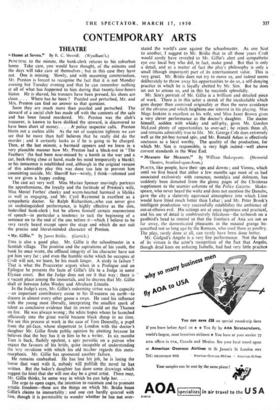, c Mr. Gillie." By James Bridie. (Garrick.) THIS is also
a good play. Mr. Gillie is the schoolmaster in a Scottish village. The promise and the aspirations of his youth, the book he once wrote, the offhand integrity of his character have not got him very far ; and even the humble niche which he occupies at Crult will not, we learn, be his much longer. A study in failure ?_ That is what the Procurator argues when in a Prologue and an Epilogue he presents the facts of Gillie's life to a Judge in some Elysian court. But the Judge does not see it that way • there is a vacant place among the immortals, and he decrees that Mr. Guile shall sit between John Wesley and Abraham Lincoln.
In the Judge's eyes, Mr. Gillie's redeeming virtue was his capacity —an important contributory cause to his ill-success on earth—to discern in almost every other goose a swan.. He used his influence with the young most liberally, interpreting the smallest spark of talent as conclusive evidence that its owner could set the Thames on fire. He was always wrong ; the white hopes whom he launched officiously into the great world became black sheep in no time. We see this process at work in the case of Tom Donnelly, a pupil from the pit-face, whose elopement to London with the doctor's daughter Mr. Gillie flouts public opinion by abetting because he believes that the boy has it in him to be a writer. In six months Tom is back, flashily opulent, a spiv parasitic on a patron who enjoys the favours of his bride, quite incapable of understanding the wry revulsion with which his old teacher regards this meta- morphosis. Mr. Gillie has sponsored another failure.
He remains unabashed. He has lost hiT job, he is losing the house that went with it, nobody will publish the novel he has written. But the baker's daughter has done some drawing§ which suggest (to him) that she will one day be a great artist. There may, Mr. Gallo thinks, be some way in which he can help her. . . . The urge to open cages, the intention to maintain and to promote artistic freedom—these are the things on which Mr. Bridle bases Gullies claims to immortality ; and one can hardly quarrel with him, though it is permissible to wonder whether he has not over-
stated the world's case against the schoolmaster. As one Scot to another, I suggest to Mr. Bridle that in all those years Crult would surely have revealed to Mr. Gillie's alert and sympathetic eye one local boy who did, in fact, make good. But that is only a detail, and as a matter of fact the play's philosophy is only a small (though important) part of its entertainment value. This is very great. Mr. Bridle does not try to move us, and indeed seems deliberately to throw away his opportunities to do so, a self-denying practice in which he is loyally abetted by Mr. Sim. But he does set out to amuse us, and in this he succeeds splendidly.
Mr. Sim's portrait of Mr. Gillie is a brilliant and detailed piece of work. There is in this actor a streak of the incalculable which goes deeper than contrived originality or than the mere avoidance of the obvious and which heightens our interest in his playing. Miss Megs Jenkins is excellent as his wife, and Miss Janet Brown gives a very clever performance as the doctor's daughter. The doctor himself, sodden with whisky and self-pity, gives Mr. Gordon McLeod plenty of opportunities to over-act ; he rejects them all, and remains admirably true to life. Mr. George Cole does extremely well as the pit-boy turned spiv, and Mr. Ronald Adam is effectively unctuous as a local worthy. The quality of the production, for which Mr. Sim is responsible, is very high indeed—well above current standards in the West End.


































 Previous page
Previous page